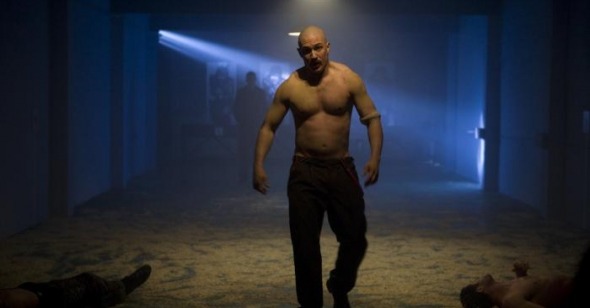Sound and Fury . . .
by Justin Stewart
Bronson
Dir. Nicolas Winding Refn, Denmark, Magnolia Pictures
Though Bronson, about England's most notorious inmate, fights and sweats to furnish some sort of point out of its menagerie of beat downs and stylistic gambles, it ultimately fails. That’s not to say that the effort isn’t occasionally admirable. It’s debatable whether a guy famous for the length of his jail stay (his tenure's been eccentric and brutally solitary) deserves his own movie, but Bronson is validated by the verve with which the director Refn and star Tom Hardy commit to justifying its existence. It's just not always pleasurable company.
One could argue (with certainty of winning) that the lowlifes of Refn's Pusher trilogy weren’t a charming bunch, but the stubborn stylistic sameness was mesmerizing in those films, and the action wasn't confined to prisons, as it largely is in Bronson. The least Pusher-like stunt in Bronson is a surreal onstage direct address delivered to us and a dark room of catatonic theatergoers by the convict. Hardy mugs brazenly, almost irritatingly, made worse by the fact that his bald dome and Gene Shalit mustache are egregious alone. Looking like G. Gordon Liddy meets GG Allin (adding epically beefy musculature), Hardy dominates every frame whether he's trying to or not, even going full frontal more than once, proving his physical dedication to the role.
"Charles Bronson" was actually born Michael Peterson, a Welshman. It was a fight promoter who suggested he borrow the moniker of a tough-guy actor. When he was 19 he made a bumbling attempt to rob a post office, making off with £26.18 and receiving a hefty seven years, although no one was hurt. He's now 56, and except for two very brief releases, he's spent the entire interim behind bars, including 30 years in solitary confinement. This is thanks to his penchant for beating up guards and holding them hostage in doomed attempts to escape (or just get attention). These "fight" scenes (Bronson kicks everyone's ass until he's finally drugged or clubbed unconscious) make up much of the movie, but the concealing choreography and edits more often than not muffle the attempts at visceral verité.
Hardy put on the pounds of muscle, and it's him swinging his meaty fists and hurling around guards, but it's Refn you worry about hurting himself. He seems to sprain his imagination in his attempts to make Bronson interesting, sympathetic, and even redeemable. The real Bronson, like this one, writes, draws, and paints, but Refn also wants his beatings of innocent guards, even his daily pushups, to come across as some symbolic act of stifled creativity. When he finally finds a "canvas" at the end, the sound and fury of the scene are deafening but hollow, hinting that the movie's "artist without an art" tack was probably misguided all along.
It's also possible that Refn, who shoots chronologically, began his movie not knowing its significance, hoping some ideas would reveal themselves in the process—not an unworthy or new way to create (Cassavetes, Gimme Shelter, even Pusher). The slot machine approach to moviemaking, of course, carries the risk of missing the jackpot. The supposed "indictment of celebrity culture" strapped to the surreal onstage scenes feels as tacked-on as the film's vicious-brute-as-smothered-artist angle. Hardy sings about being a rock star because of his hostage-taking shenanigans at Broadmoor Prison, but we're never really shown the extent of his notoriety among "fans," and how the movie, which will boost Peterson's fame, calls the validity of his or any other celebrity's status into question is murky.
A segment that the script invents—in which Bronson is released for months and pursues a career as a bare-knuckle amateur fighter—is one of its finest. It’s a respite from the dinginess of solitary, and features a droll turn by Matt King as Bronson's chain-smoking promoter Paul, who he'd met previously in jail and who gives him his name. Itching for more prestigious bouts, Bronson is rebuffed by Paul, who sums up the previous fight nicely: "You just pissed on a gypsy in the middle of nowhere—hardly the hottest ticket in town, darling." King’s arrogant effeminacy and disregard for his own health make him an amusing foil. Also during this period of freedom, Bronson forges a relationship with a bored redhead (Kelly Adams) with a taste for rough of his sort. These scenes are more predictable, with the brute all thumbs, La Strada–like, when it comes to romance, stealing the shiniest diamond ring in the store to impress her.
Celebrating the things it tries to condemn, Bronson ends up confused. Its lack of actual sensitivity is apparent in scenes like one in the psych ward where a heavily sedated Bronson sits drooling. At one point there's a grotesque dance party at this “funny farm,” and Refn plays it for laughs. Like most of the movie, it's just empty shock value. Despite all of the screaming in Bronson (it might break a record for the amount of times "fookin' cunt!” is uttered), it never says much of anything at all.
